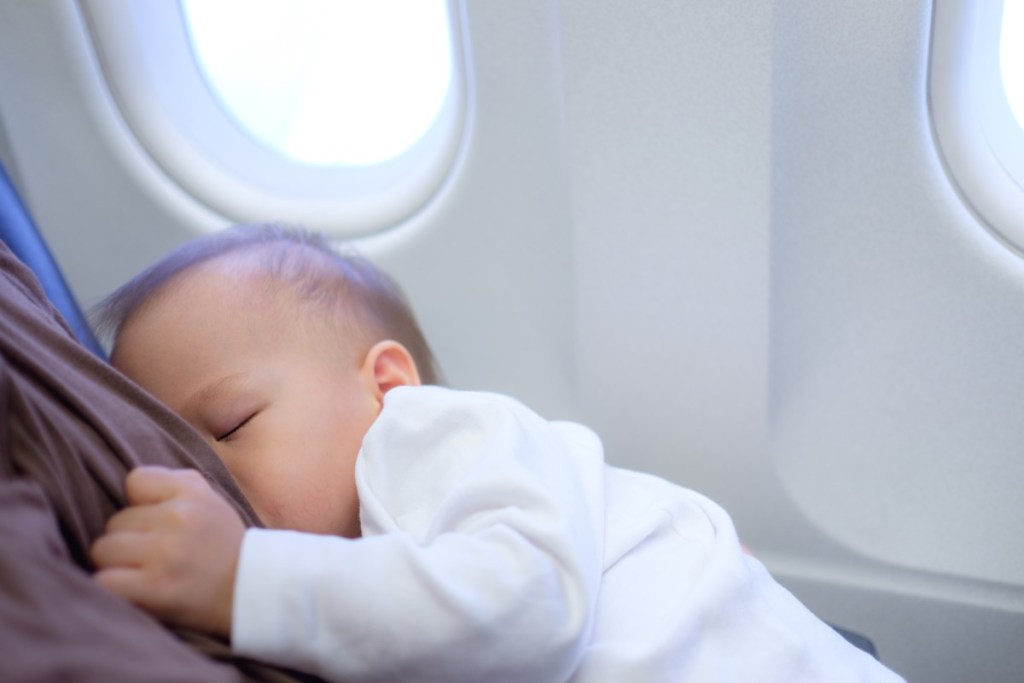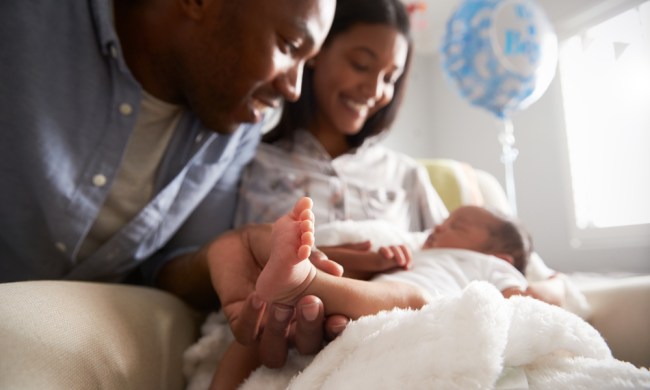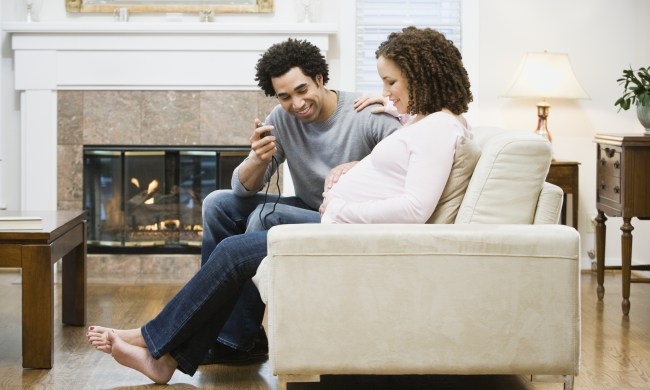Flying with newborns and infants — it’s not for the faint of heart. But if your love of travel (or, say, a cross-country family obligation) takes you aboard an airplane with your little nugget in tow, you will want to be prepared, take some precautions, and think through a few important implications. Ready to take to the skies? Here’s what you need to know before boarding with your baby.

How old does a baby have to be to fly?
Most infants can travel by air without cause for concern. Of course, you might want to consider waiting at least a little while before taking that brand-spanking-new baby of yours on a plane. A newborn’s immune system is very immature; taking a bitty baby out in public in an enclosed space with recycled air and frequently touched surfaces isn’t necessarily an ideal situation.
That said, talk to your pediatrician if you’re thinking about jet-setting with your newborn. Do note that if your little one was born premature or has any condition that further suppresses the immune system, your doctor might advise holding off.
Tips and tricks to make it easier
It’s not going to be easy, but arming yourself with information can help make the experience a little calmer, quieter, and less stressful for you and your tiny traveler. Here are some tips to keep in mind:
- Plan wisely: You may have lofty goals for your first vacation with Baby; but, if possible, keep that first destination relatively low-key. A shorter flight will be more manageable at this stage — so shoot for three hours or less, if possible. Also think through your baby’s routine when selecting a flight. You might want to try to time it early in the morning when they’re fresh and happy, go around your baby’s usual nap, or aim for nighttime and hope they’ll sleep through the whole ordeal.
- Go early: The last thing you need is to board your flight panting and sweating and exhausted. Cushion extra airport time into your schedule. Go early, go slow, and take it easy. Baby will pick up on your vibe!
- Consider buying a seat for Baby: You’ll need to check with your specific airline, but typically, “lap babies” under 2 years of age don’t require their own ticket. However, if you can swing it, you might consider buying an extra spot for your little one’s car seat (most options are certified for air travel). Having an extra seat in your row gives you some much-needed breathing space — and bonus storage room.
- Remember that ear pressure will happen: Newborns and infants are fussy for all sorts of reasons. But you may find that your sweetheart is especially upset at takeoff and landing time. Just as ascending and descending can be bothersome your adult ears, it can cause oscillating pressure and pain for their tiny ones.
- Wear your baby: Bring your carrier or sling and wear your newborn to free up your arms and keep them snuggled close. This can also help during the hustle-bustle airport experience — while going through security gates and racing through terminals.
- Stay friendly: Let’s be honest, no one wants to be seated directly adjacent to a parent with a baby (or toddler, for that matter). Hopefully, you will find that surrounding passengers will treat you with kindness and empathy. In the meantime, do what you can to be gracious in this situation. Babies will be babies; you don’t have to apologize for your helpless child’s outbursts, but you can acknowledge a disturbance and thank strangers for their cooperative understanding.
What to pack in your carry-on
Keep calm and carry on — make sure you have everything you need for yourself and your baby within reach. Here are some must-have items to add to your checklist:
- Pacifier: You want to encourage your baby to swallow or suck during takeoff and landing, as this will help quell the pressure buildup in their middle ear. Of course, this is easier said than done; you can’t explain to an infant that this feeling is fleeting. To this end, gently place a pacifier in your little one’s mouth — if they’ll accept it. (Consider using a binky clip so it doesn’t get lost mid-flight.) If you nurse, you can offer your breast or a bottle during rapid pressure changes. Either option will help to distract your baby and offset the discomfort.
- Snacks and drinks: If your little one is a bit older (aka a mini munching monster), you’ll want to make sure you pack plenty of bribes, er, snacks. Desperate times call for desperate measures — and if that means endless cookies and puffs, go for it. If you are formula-feeding, small and convenient ready-to-pour bottles will come in handy for this purpose. (At the airport, be sure to alert TSA officials that you are traveling with liquid formula.)
- Toys and board books: Even the littlest cutie-pies can benefit from a little mid-flight entertainment. If your child is teething, be sure to take their favorite chewable items. Small board books can also offer momentary distraction and engagement.
- Noise-canceling headphones: If your infant gets upset every time you take out the vacuum or while in a loud situation, you might consider getting infant-sized noise-canceling headphones for the flight. It’s noisy in the cabin, and the experience can be jarring for a babe.
- Usual diaper-bag essentials: Packing for a trip is daunting for anyone, but it’s especially overwhelming when you’re also preparing items for your little one. While you’re grabbing all the extras, be sure you don’t forget your regular diaper-bag must-haves: Diapers, wipes, a change of clothes, etc.
Traveling is always an adventure. Doing it with a newborn, infant, or toddler is extra challenging but equally rewarding. Baby’s first flight may go smoothly — or it could be harrowing. There may even be tears — from you and your pint-size flyer. But if you’re prepared, you can get through the turbulent times with agility, humility, and — fingers crossed — a lengthy nap.


